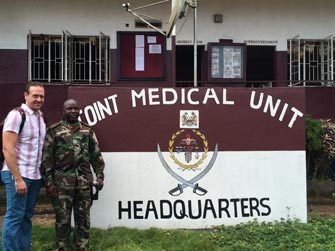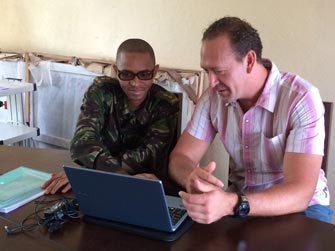CDC’s Disease Detectives Respond to the 2014 Ebola Outbreak: Greg
About CDC
Disease Detective: Greg

LCDR Greg is an officer in the United States Public Health Service and works as a CDC disease detective
Greg is no stranger to risk. Originally trained as a Navy diver, he is now a CDC detective and an officer in the US Public Health Service. He has worked on several potentially dangerous diseases, including Leishmaniasis, H1N1 influenza, MRSA, and Rocky Mountain spotted fever. So when the call came to be deployed to West Africa for the Ebola outbreak, he wasn’t concerned.
In fact, he readily volunteered.
Greg is just one of the more than 50 disease experts CDC has deployed to Africa during the past two weeks to help bring the largest Ebola outbreak in history under control. This is Greg’s third time back to West Africa. He previously lived in Ghana for three years working on infectious disease studies and surveillance, and before that, he was in Kenya working on famine response.
This time around, he is going to help with the vital and enormous task of contact tracing for the Ebola outbreak. Contact tracing is at the heart of efforts to control this deadly virus. It involves interviewing a patient with Ebola to identify everyone they have come in contact with since their symptoms began. Then each contact must be followed for 21 days. If even one contact is missed, there is a risk for further spread. Contact tracing is a daunting task, but it is one, Greg says, “that CDC trained me to do. It will be a good opportunity for me to use my skills and training.”

CDC Disease Detective Greg (left) works on Ebola contact tracing with officers from Sierra Leone’s Armed Forces.
Like all CDC staff, Greg is as aware of the risk of non-action as he is of the personal risks. “Being safe and careful are guiding principles of our mission to stop the spread of Ebola. My short-term goal is to help do the basics of public health epidemiology – preventing the spread through contact tracing – with the long- term goal of ending the outbreak. It will happen, but only through painstaking hard work.”